It’s safe to say that most people would be completely lost if they had no electricity. Modern technology has spoiled us, and quite frankly, it feels good. Who doesn’t like the luxury of turning on a light switch and, voila? Unlike those who came before us, we don’t have to worry about cooking over a wood fire or carrying a lantern when it’s dark to get light. With that said, electricity is faulty and it fails us sometimes. We need to be prepared if there comes a time when we can’t use it.
I turned off our electricity for 48 hours this week as one of my challenges for National Preparedness Month. And once again, just like with my Living Without Running Water experiment, I learned a lot!
Learn How to Cope without Electricity
If you joined me in the challenge or have experiences of your own, I’d love to hear about them! By the way, I’m by no means an expert in this area. In fact, this is the first time in my adult life that I have lived without electricity for an extended period of time. So, while I believe that my experience will be helpful to those with a similar background, I’m also sure there are many of you with more experience, thoughts, and ideas.
Modern Conveniences Helps Us During a Power Outage
Living without electricity and water was stressful for me! I was more on edge and grumpy than my kids. I was still trying to do everything that I usually do, but it was taking me more time. All the typical “life” stuff like dinner, blogging, and cleaning took longer, and it wore me out! So, again, I am grateful for my modern conveniences!
But I want to be prepared for the burden that a real disaster or power shortage could bring. Stress is real, and it can affect family life dramatically. I want to be able to stay as calm and content as possible in such a situation. My kids will need me to! I believe that the more prepared I am, the less stressful things will feel, and I’ll be more relaxed. Honestly, my motivation to be more prepared increased during the challenge.
12 Tips and Tricks to Cope with Power Outages
Tip #1 when Living Without Electricity: The Food from the Fridge/Freezer
I shut off all of the breakers in our house except those to our fridge and the freezer in our garage. I did not want to risk losing any food for the sake of an experiment. However, if I were to encounter a real power outage, I do have a plan:
I would move three days’ worth of food to a cooler that we have that’s fantastic. We take it camping, and it keeps our food frozen and cold for up to five days. I would also include two 1/2 gallon containers of frozen water (I have these in the freezer in our garage). The cooler would stay in our cold storage in our basement and only open if needed.
Also, I would move the rest of the food from my indoor fridge and freezer to the large freezer in my garage. After three days, I would open the freezer again and move only what I needed for the next three days to the cooler. I would continue this until either the food was bad or the power was back on.
As a rule of thumb, you should pack the food, so it all stays cold or frozen for as long as possible.
Tip #2 when Living Without Electricity: Find Alternatives to Electronics for Kids!
When I told my children that we had no water a few weeks ago, they panicked about not being able to bathe, brush their teeth, or have a drink of it. When I told them this week that our electricity had gone out, their first question was, “Well, so that means…(big pause)….we just have to…(another big pause)…play?”
Yes, kiddos! No TV. I’m not re-charging the iPad and there’s no CD player for dancing. You will need to just play!
I think I do reasonably well with limiting my kid’s electronic time. But of course, I have my days where I use it as a babysitter. However, for the most part, it is restricted, both in time and in content. They are only allowed to watch or play educational shows and games the majority of the time. Furthermore, their use of electronics is tied directly to their responsibilities and chores. They earn fake money for their house duties and can use those funds to buy media time. They have kids playtime every day, as well as mommy playtime and quiet room time.
I will say, their commentary about not having electricity was an eye-opener! They found it overwhelming to have to“just play” all day long. I will be working a bit harder on fixing that! I want to raise creative children who enjoy spending time together by using their imaginations. All in all, they were fine and had a fun two days. However, when it came down to it, I was actually more stressed than they were; which brings me to my 2nd point.
My Kids Loved Having Their Own Flashlights
These were crazy inexpensive, and I almost didn’t buy them— but I’m glad I did. My kids loved having their own flashlights around their necks. It’s quite silly, but it’s something I discovered!
Tip #3 when Living Without Electricity: More battery clocks!
This is kind of funny, but all of our clocks are electronic — the timer on the microwave, the range, the alarm clocks, everything. I found myself constantly wondering what time it was!
I should store batteries and flashlights together 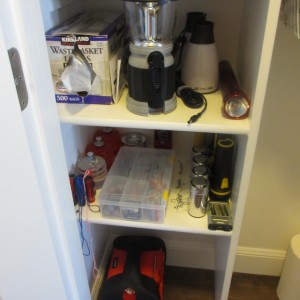
I keep all of our power outage supplies in a hall closet upstairs. But I don’t keep batteries in our flashlights because that drains the batteries. I only add them when we need to use the flashlight, and I store the batteries downstairs! That would be a problem if the power went out after dark and I had to make my downstairs to get them. So, I moved the batteries into the closet upstairs with the flashlights. I also put one with batteries in it in my top dresser drawer. That way, I can quickly jump out of bed and have light if I needed it.
Tip #4 when Living Without Electricity: Manuals Are a Good Thing to Have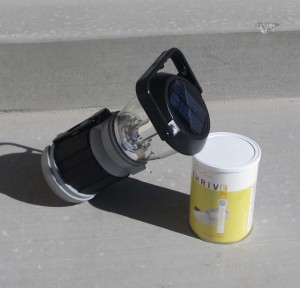
I discovered that even though I read the instructions for all of my various power outage supplies, I couldn’t remember how to use them properly. I was glad that I kept all the manuals. I have them in a plastic Ziploc right near the rest of the supplies (behind the lantern in the picture above). I used them to learn how to power our solar lantern, use our small generator for my computer and internet router, and our goal of zero supplies.
One resource I would definitely suggest having is the manual to your garage door. You might have a battery backup that would allow you to open it during a power outage. However, if the outage lasts for a long time or you don’t have a secondary battery on your door, you will need to know how to disconnect the door from the powered carriage. Otherwise, you won’t be able to get your car out! Your manual will have instructions on how to do it.
Tip #5 when Living Without Electricity: Test Products Beforehand!
I have two Goal Zero Light a Life lights that are extremely high-powered lights that I planned to use instead of candles during a power outage. Goal Zero products are solar-powered and SUPER bright. I can charge them during the day and use them at night indefinitely. Unfortunately, I opened them and removed them from the box after the power went out, only to realize that they didn’t include the necessary battery to power them, so I had no way to use them. I had assumed the batteries came with the lights, but they didn’t, which made them useless! Needless to say, I will be buying the battery soon!
I’m Glad We Have Satellite Internet.
We were able to use our small generator to power the router and computer which allowed us to have internet access and still run my business. Even during a widespread power outage, it is unlikely that the power would be out nationwide or worldwide. I have people who follow this blog and purchase from me from all over the United States, including Hawaii and Alaska, as well as Canada. The work I do brings in a significant portion of our income, and if the electricity were out for more than a day or two, I would have to find a way to continue to work.
Furthermore, having internet access would allow us to communicate with worried family and friends.
Tip #6 when Coping with a Power Outage: A solar generator would be great!
The small generator we have now is battery-powered. I’d have no way to charge it during a power outage. Once it ran out of “juice,” that would be it. No more computer/internet.
So, I’d like to get a solar generator. Of course, I’d love a really expensive one that could actually power my appliances, but for now, I’d settle on this one: Goal Zero Escape 150 Adventure Kit. It comes with a 150 (a rechargeable battery), the light I love as well as a solar panel to re-charge the battery. I will likely get two eventually so we could use one while the other was charging. It would power my computer, our router, our phones, a small CD player, etc.
Tip #7 when Living Without Electricity: Print Things!
Are there things you regularly use that are on your computer that you don’t have printed? For example, I needed my recipes, and I didn’t want to turn on my computer and waste power on something I could have had in a printed form.
Tip #8 when Living Without Electricity: More Solar Powered Batteries!
We have a few AA-sized batteries and the Goal Zero pack to charge them, but I’d like to get something that can charge large D-sized batteries for our flashlights.
Tip #9 when Living Without Electricity: If the Power Were to Really Go Out, I’d Bathe Right Away.
We have two water heaters and had hot water for the entire first day and even into the 2nd. Eventually, we ran out as the water in the heaters cooled.
I prefer warm showers, so if the power were out and we still had running water, I’d shower immediately so I’d lower my chances of having to take a cold shower.
Tip #10 when Coping with a Power Outage: The Dispose Won’t Work in a Power Outage.
Duh, right? Well, that was something I didn’t think about and I dumped food scraps into disposal out of habit. The sink was full of water because it couldn’t drain, and fishing the food out was gross! Next time, I will remember that and we will put food scraps in the trash instead.
 Tip #11 when Coping with a Power Outage: Practice Powerless Cooking Skills
Tip #11 when Coping with a Power Outage: Practice Powerless Cooking Skills
Seriously, why is the Sun Oven so tough for me? Once, I got it up to 400 degrees within 30 minutes, but when I put the food in, it started to fog up the window. Sadly, the temperature dropped to 225 degrees within just a few minutes, and it never increased. I think part of the issue was the pan I used. Nonetheless, we ate our dinner, and it was fine; it just took a lot longer to cook. But darn it, that happens to me every time!
I also cooked some instant brown rice on our camp stove, and it turned out great! Plus, I did an experiment. I wanted to see if I could hydrate the instant brown rice without heat. It totally worked! I added 1 1/2 cups of water to 2 cups of rice and stirred it occasionally for about 90 minutes. It hydrated fine, but it was cold. But at least I know I could use it without any heat if I needed to!
I also remembered that I bought a Volcano stove about a year ago, and I’ve never used it. I forgot about it and didn’t plan to use it during this outage. However, I’ve heard incredible things, so I need to practice with it some more.
But I am good at Dutch Oven cooking! My Dad taught me that growing up and it is something I’ve always loved. We had delicious chicken & black bean tacos as well as some cobbler! I was going to post the recipes here, but I think I’ll save it for another time.
I need some powerless appliances
I needed a food processor for our dutch oven dinner, and I have to admit I cheated. I didn’t realize beforehand that some of the ingredients would need to be blended. So, I flipped the breaker on and used my electric food processor. But, I’d love to get some powerless appliances like a food processor or blender, and I already have a Hand Grain Mill.
We Need A Game Plan For Our Powerless Cooking
I would like to create a list of at least one month’s worth of meals for breakfast, lunch, and dinner so that I could make shelf-sustainable ingredients without power as well. I plan to start working on this and will share what I come up with.
Tip #12 when Coping with a Power Outage: More Fuel!
As part of the game plan that I mentioned above, I will be pinpointing exactly how much fuel we should store. We have the Volcano Stove, a propane gas grill, dutch ovens, a camp stove, the Sun Oven, and will soon have a fire pit. Here’s what we will store:
- Charcoal (Volcano stove, Dutch Ovens)
- Propane (Volcano stove, gas grill, camp stove)
- Firewood (Volcano stove, fire pit)
- Quickfire Pucks (Volcano stove, fire pit, and the Quickfire stove if I decide to get one)
Common Causes Of Power Outages
We’re so accustomed to flicking on the switch when walking into a room and grabbing the remote to watch television. However, there are several causes of power outages that you should be aware of. Unfortunately, every occurrence doesn’t happen as a result of a major storm. Here are a few:
- Trees
When the wind is high or someone is trimming branches, limbs can hit the power lines. If this happens, your power can out for a few minutes or a few hours.
- Vehicle Accidents
If a car hits a utility pole, there’s a good chance that your power will go out.
- Lightning
Lightning can get pretty severe during a storm. When a bolt hits wires, poles, and transmission powers an outage might occur.
- Animals
I know you’ve seen birds and squirrels hanging out on the power lines before. Unfortunately, when small animals come into contact with electrical equipment, it can cause a short circuit.
- Storms
Storms are the most common cause of power outages. Wind, ice, snow, and heat can all contribute to your electricity going out.
- High Power Demand
When cables become overloaded with the power it can cause the system to fail. Power sources such as transformers, transmission towers, and other electrical equipment can melt when under the pressure of heatwaves and high power demand.
Final Thoughts
I know the thought of not having electricity isn’t comfortable, but this website is all about preparedness, right? You don’t want to get stuck in a situation, and you’re clueless about what to do. Hopefully, the information I provided will help you stay ahead of things, and equip your family for emergency situations. The good news is, that life doesn’t have to fall apart when there’s no electricity. With that said, I’d love to hear from all of you!
Did you take my challenge as part of National Preparedness Month? Or have you ever lived without electricity for a period of time? What did you learn? Do you have additional tips for my readers and me?
Pin It Now For Later!
Becky is a wildlife enthusiast and pet and livestock care expert with a diploma in canine nutrition. With over a decade of experience in animal welfare, Becky lends her expertise to Simple Family Preparedness through insightful info about pets, livestock, bee keeping, and the practicalities of homesteading.

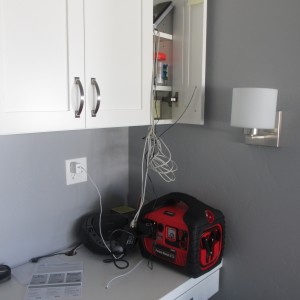

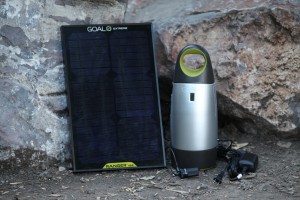
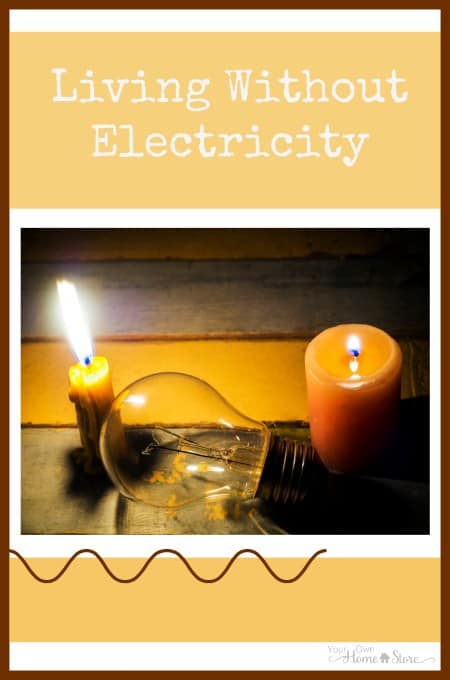

In Georgia you also have to remember bug spray when having to rely on the power outages. But you can fish and get food and e row our own vegetables. Plus there are lot of wild turkeys or hogs if you get desperate or deer. We are survivors. We can do our wash by hand if need be in the bathtub. When they tell us the storms and hurricane or tornado warnings are coming, we fill the tubs and sinks with water . When her is a storm and power-goes out so does water pumps for the wells.just a thought. Also I learned from Grandma to soak a sheet and pin it up in front of the screen. It works like an ir conditioner.
We live in Georgia . We have hurricane season every year. Downed trees, roof damage, siding blows off on occasion. Once a tree came through the roof of the house and into Mom’s room. It took four months to repair her room and fix the roof. However we were without power and water. We stayed in the pool house it was crowded., but we survived. That was the only way we could have power. We had to cook on the grill., by the pool. We had TV.s and cable at the pool too. So we survived. We got those from the hotel when they remodeled.
Just read your article… really good info. As added info, in 2006, we had a very bad ice storm in our area. Power was out for 5 days. But… our stove and water heater were gas and we had a fireplace. So, other than having to use double the blankets (did I say this was in January?), we managed quite well.
Can you share the type of cooler you were talking about?
Omg so…back earlier this year we had a big storm, no power for 3 days. We had just moved to a new area, completely inexperienced with how to deal with power outages so we crashed at our holiday home ♀️
We have a good generator now so we’re sorted!
Well, these are exactly the situations we hope to help you with. The advice and tips we post here are the ones that should prepare you for these kinds of unfortunate events. Thanks for sharing this experience, Julie!
I have had to use kerosene heater for heating and cooking on a few occasions because of power outages. We had kerosene stored back and it was really like using a gas cook top. Just have to make sure you sit the heater by a window that is cracked open a little for ventalation.